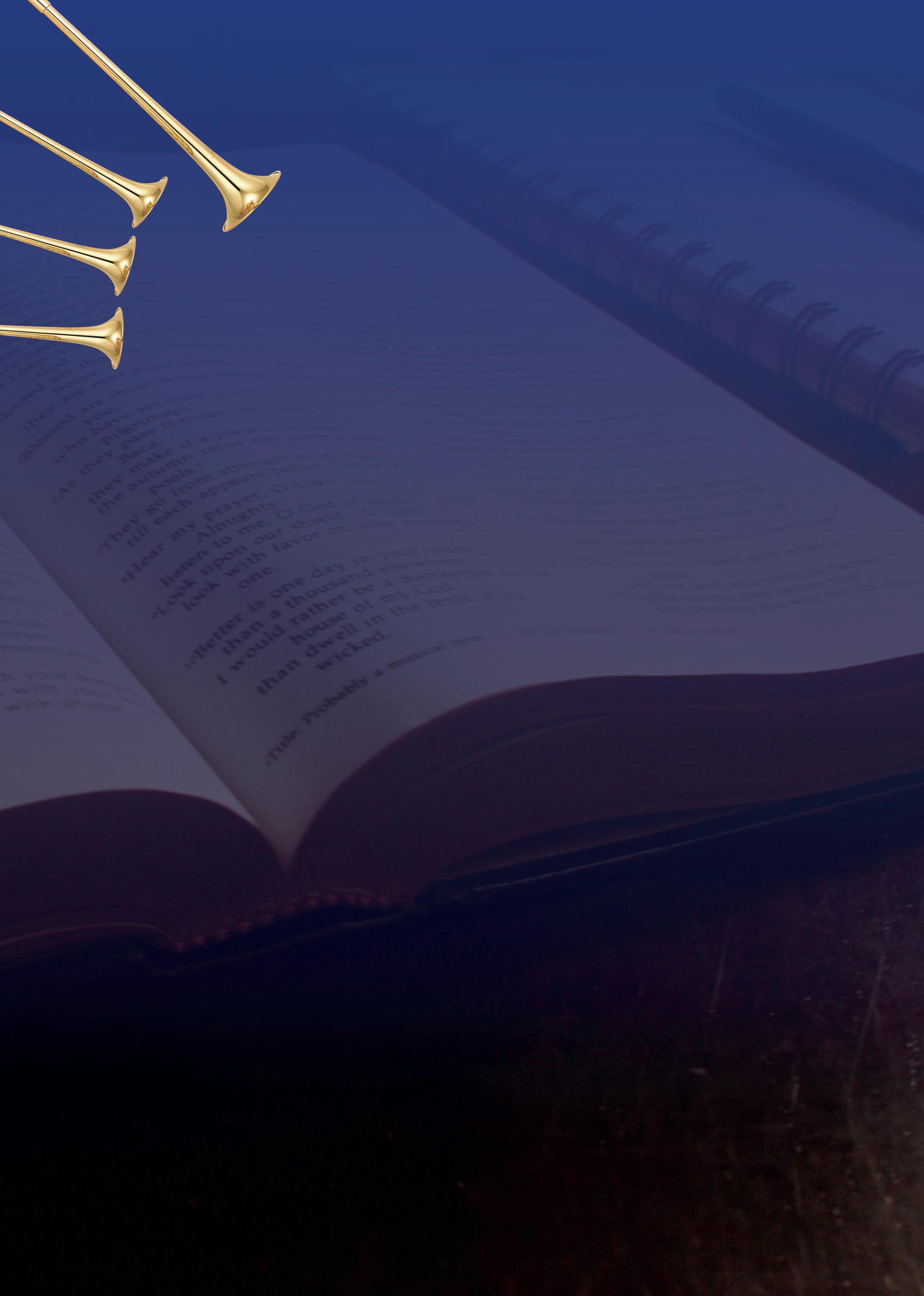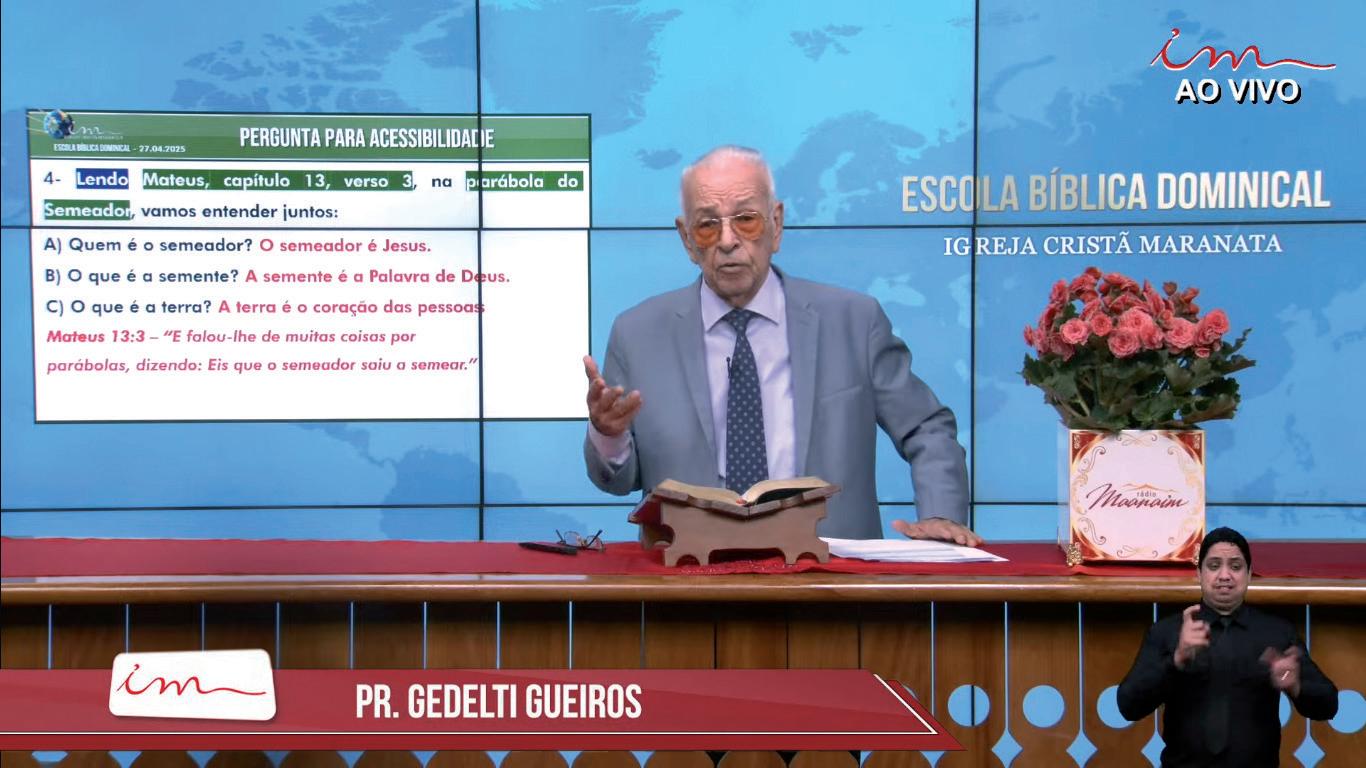Sunday Bible School
April 27, 2025

The Preparation of the Church for the Rapture - Revelation - Part XLVI



April 27, 2025

April 27, 2025

The Preparation of the Church for the Rapture - Revelation - Part XLVI



April 27, 2025
Summary of the president’s message
The Sunday Bible School on April 27th, 2025was held live, directly from the Communications Center of the Maranatha Christian Church in Vila Velha, Espírito Santo, with the participation of pastors Gedelti Gueiros, Gilson Sousa and Josias Junior.
Message from pastor Gilson Sousa:
We greet all ourbrothers and sisters with the peace of the Lord Jesus! We are starting Sun-
day Bible School. The subject to be presented is the book of Revelation: the message of the Holy Spirit resonates in the midst of the Faithful Church, in relation to the prophetic markers that are being fulfilled in our day, in the preparation of the Church for the rapture.Pastor Gilson Sousa presented the answers given by various brothers to the questions posed, as well as various experiences and testimonies.
Question
Answered through video contribution
As a way of reviewing what

we have studied and reading Revelation, chapters 2 and 3, summarize the main historical and prophetic aspects of the Faithful Church, from the period of Ephesus to the period of Sardis, considering the historical period of each letter:
a. Ephesus
b. Smyrna
c. Pergamos
d. Thyatira
e. Sardis
Answer:
a. Ephesus: Acceptable / pleasant –“I know your works, your labor, your patience....” Revelation2:2
b. Smyrna: Myrrh, suffering, fragrance –“I know your works, tribulation, and poverty (but you are rich) ...” Revelation2:9
C. Pergamos: Perverted Marriage –“... because you have there those who hold the doctrine of Balaam[...].” Revelation2:15“Thusyou have those who hold the doctrine of the Nicolaitans[...].” Revelation2:14
d. Thyatira: Continuous sacrifices –“...Jezebel, who calls herself a prophetess, to tea- Pr.

ch and seduce My servants to commit sexual immorality and eat things sacrificed to idols.”
Revelation2:20
e. Sardis: Remnants (who were about to die) –“Be watchful, and strengthen the thongs which remain...;” Revelation3:2
Question
Answered through video contribution
Make the prophetic application of the glorious title of the Lord Jesus in each letter.
a. Ephesus
b. Smyrna
c. Pergamos
d. Thyatira
e. Sardis
Answer:
a. Ephesus: “He who holds the seven stars in His right hand,
who walks in the midst of the seven golden lampstands...”. Revelation2:1
Prophetic application:
b.Smyrna: “the First and the Last, who was dead and came to life”. Revelation2:8
Prophetic application:
c. Pergamos: “...He who has the sharp two-edged sword...”. Revelation2:12
Prophetic application:
d.Thyatira: “...the Son of God, who has eyes like a flame off ire, and His feet like fine brass.” Revelation2:18


Prophetic application:
e.Sardis: “...He who has the seven Spirits of God and the seven stars...” Revelation3:1
Message from pastor Gedelti Gueiros:
We are living in a special moment. There is an appeal from other evangelical groups about what is being spoken about in our Sunday Bible School. That’s why we’re going to review the first letters again.
It’s one thing to talk about the historical aspect. Anotherthing is the prophetic aspect. We will find in the seven letters the historical aspects and the prophetic aspect, both relating to the time that the church has lived since day one. The period of the Faithful Church begins at Pentecost and ends at the rapture.
Each period has a variable
duration, in the historical sense. However, the emphasis for each moment is not on the dates or the historical period, but on what the Holy Spirit was accomplishing.
In Ephesus, reference is made to the one who walks among the seven golden lampstands.
“To the angel of the church of Ephesus write, ‘These things says He who holds the seven stars in his right hand, who walks in the midst of the seven golden lampstands...” Revelation2:1
In Ephesus, a church was born that was going to live in a different way to Judaism, reason or what was philosophical. It wouldn’t just be a liturgy. Now, it was the Holy Spirit who would be at work. That’s why we see the reference to the seven lampstands. The seven lampstands are related to
theseven Spirits of the Lord, recorded in the book of the prophet Isaiah.
“The Spirit of the Lord shall rest upon Him, the Spirit of wisdom and understanding, the Spirit of counsel and might, the Spirit
Click here or scan the QR Code below to watch the entire sunday bible school session.
of knowledge and of the fear of the Lord.“ Isaiah11:2
In Ephesus, a fundamental operation takes place, because the Spirit of the Lord shows himself in a special way, because it was the beginning of the Apostolic Church. So, from this moment on, the Spirit of the Lord will command all things. And the Lord warns: if they do not repent, I will take away your lampstand.
“Remember thesefore from where you have fallen; repent and do the first works, or else I will come to you quickly and remove your lampstand from its place – unless you repent.” Revelation2:5 (added emphasis)
The Spirit of the Lord has continued to work throughout the Church’s history. However, many have lost the operation of this Spirit, returning to the liturgies without the blessing of the Holy Spirit.
In each period there is an operation linked to the parables of the kingdom, recorded in chapter 13 of the Gospel of Matthew.
In Sardis, the religious reformation of the 16th century took place. Notice that at the opening of the letter, the Lord again mentions the seven spirits of God.
“And to the angel of the church in Sardis write, ‘These things says He who has the seven Spirits of God and the seven stars.” Revelation3:1 (added emphasis)
Why is that? Because what was lost after Ephesus, especially in Pergamos, was
restored in Sardis. That’s why revivals started in Sardis and continue to this day. What had been the letter in previous periods became the revelation. In this way, everything was prepared for the rapture of the church.
In Sardis, the operation was by the Spirit of Might. The treasure was hidden in a field. And one man, in the parable, found the treasure that was hidden. It was Martin Luther.
“Again, the kingdom of heaven is liketreasure Hidden in a field, which a man found and hid; and for joy over it he goes and sells all that he has and buys that field.” Matthew 13:44
In this way, Martin Luther established the theses of the reformation that would reshape the trajectory of the Church. He then took refuge in the castle of Wartburg. At the castle, Luther translated the Bible and wrote his commentaries.
Now, it was the Gospel that would prepare the Church for his departure. At the beginning (Pentecost), the Holy Spirit had been poured out for the Church’s departure. Now, it was the outpouring for the church to reach eternity.
Luther was a philosopher and music teacher. He took refuge in the castle because, naturally, the church was beginning to be persecuted again. He composed thehymn of the reformation: The Mighty Fortress. In the hymn, he says: “That Word above all earthly powers”.
Thus, in Pergamos, the church
ceased to be prophetic and became historical. But prophecy would return in Sardis. From that moment on, the Word wouldhave a different meaning. The church would not be abandoned. These were the theses: salvation by faith; Jesus, the only mediator between man and God; the universal priesthood of the believer (the believer does not need mediators); the Bible as the only rule of faith and practice. The Word has been restored.
There is a wonderful story, revealed. This is not a talk about archaeology or history, although they are very interesting subjects. But it is about what is prophetic. The same Spirit who worked in Ephesus is working in our day.
May the Lord Bless us,
Pr. Gedelti Gueiros President of the Maranata Christian Church
April 27, 2025

The Preparation of the Church for the Rapture - Revelation - Part XLVI
